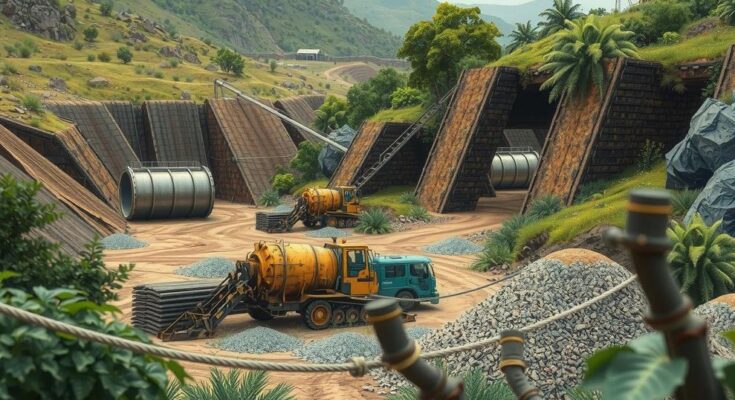Tin prices have surged to over two-year highs due to a mine operation halt in the DRC, compounded by unrest from the M23 rebel group. The political instability, along with global supply shortages, has significantly impacted the tin market, raising prices and affecting Alphamin Resources’ stock performance.
Tin prices have reached their highest levels in over two years, primarily due to a temporary suspension of operations at the Bisie mine, owned by Alphamin Resources, located in the Democratic Republic of the Congo (DRC). This cessation has been prompted by unrest in the North Kivu province, where the M23 rebel group has made territorial advancements, threatening the mine’s safety. The town of Nyabiondo was overtaken on March 9, followed by Kashebere shortly after, further complicating the operational environment.
As a result of these developments, tin prices soared to approximately $37,100 per tonne in London, marking the highest prices since June 2022, before adjusting to $36,280 per tonne later in the day. Following a substantial 7.4% increase the previous Thursday, tin futures in Shanghai also reached their daily maximum limit. Market analysts from First Futures Co. have indicated that the ongoing mine suspension will exacerbate the existing global tin ore shortage.
Alphamin’s shares surged by 8.4% in Toronto, which elevated its market valuation to $443 million. The suspension at the Bisie mine is further compounded by political instability in the DRC and a halt to tin mining activities in Myanmar’s Wa State, contributing to a cumulative rise of approximately 25% in London Metal Exchange (LME) tin prices this year. In 2024, the Bisie mine accounted for around 6% of the global tin supply, producing 17,300 tonnes.
The civil unrest has intensified since January; the M23 rebels have captured two of eastern Congo’s major cities amid a conflict rooted in the aftermath of Rwanda’s 1994 genocide and the intense competition for the DRC’s mineral wealth. In light of these tensions, Angola’s government has announced forthcoming direct negotiations between the DRC and the M23 rebels, which would represent the first formal discussions if confirmed. However, there remains uncertainty regarding the participation of President Félix Tshisekedi, who has historically opposed direct engagement.
In summary, the suspension of the Bisie mine operations has triggered a significant rise in tin prices, influenced further by ongoing political strife in the DRC and a concurrent shortage in the global supply of tin ore. The situation remains fluid as negotiations potentially loom between the DRC government and the M23 rebels, which may affect the mining landscape moving forward.
Original Source: www.mining.com




